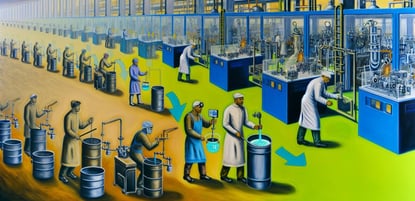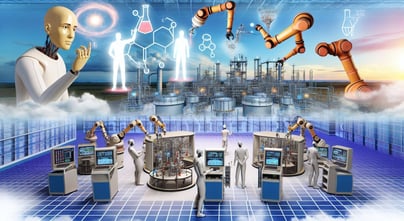Robotics and Automation Integration in Production Planning
Staying competitive means embracing innovation at every level of operation in chemical manufacturing. One area where this is increasingly evident is in the integration of robotics and automation into production planning processes. As the demand for efficiency, quality, and safety continues to rise, manufacturers are turning to advanced technologies to optimize their operations.
In this blog post, we'll explore the significance of integrating robotics and automation into production planning in chemical manufacturing facilities. Additionally, we'll delve into the benefits and challenges of integrating these technologies with existing ERP, SCM, and MES systems, with a particular focus on the integration between PlanetTogether and leading solutions like SAP, Oracle, Microsoft, Kinaxis, and Aveva.

The Evolution of Robotics and Automation in Chemical Manufacturing
Historically, chemical manufacturing has been a labor-intensive industry, with many processes requiring manual intervention. However, with advancements in robotics and automation technologies, manufacturers now have the opportunity to streamline operations and improve overall efficiency.
Robotic systems are being increasingly deployed in chemical manufacturing facilities for a variety of tasks, including material handling, mixing, blending, packaging, and quality control. These robots are equipped with advanced sensors and algorithms that enable them to perform tasks with precision and consistency, often surpassing human capabilities.
Automation, on the other hand, involves the use of software and control systems to automate repetitive tasks and processes. In chemical manufacturing, automation can be applied to various aspects of production planning, such as inventory management, scheduling, and resource allocation.
The integration of robotics and automation into production planning offers several key benefits, including:
Improved Efficiency: Robots and automated systems can perform tasks faster and more accurately than humans, leading to increased throughput and reduced cycle times.
Enhanced Quality: By eliminating human error and variability, robotics and automation can help maintain consistent product quality and reduce defects.
Increased Safety: Automating hazardous or repetitive tasks can minimize the risk of accidents and exposure to harmful substances, improving overall workplace safety.
Cost Savings: While the initial investment in robotics and automation may be significant, the long-term cost savings in terms of labor, energy, and materials can be substantial.

Integrating Robotics and Automation with Production Planning Systems
While the benefits of robotics and automation are clear, their successful integration into production planning relies heavily on seamless connectivity with existing ERP, SCM, and MES systems. These systems serve as the backbone of manufacturing operations, providing real-time visibility, control, and optimization across the supply chain.
PlanetTogether is a leading provider of advanced production planning and scheduling software that helps manufacturers optimize their production processes. By integrating PlanetTogether with ERP, SCM, and MES systems, chemical manufacturers can achieve greater agility and responsiveness in their operations.
Let's explore how integration with leading ERP solutions like SAP, Oracle, Microsoft, Kinaxis, and Aveva can enhance production planning in chemical manufacturing facilities:
SAP Integration: SAP offers a comprehensive suite of enterprise software solutions, including SAP ERP and SAP S/4HANA, which are widely used in the chemical manufacturing industry. By integrating PlanetTogether with SAP, manufacturers can synchronize production schedules, inventory levels, and resource allocation in real-time, enabling better decision-making and resource optimization.
Oracle Integration: Oracle provides a range of ERP and SCM solutions that cater to the unique needs of chemical manufacturers. By integrating PlanetTogether with Oracle ERP Cloud or Oracle SCM Cloud, manufacturers can streamline production planning processes, improve supply chain visibility, and reduce lead times.
Microsoft Integration: Microsoft Dynamics 365 offers a suite of ERP and CRM applications that can be tailored to the specific requirements of chemical manufacturing. By integrating PlanetTogether with Microsoft Dynamics 365 Finance and Operations or Microsoft Dynamics 365 Supply Chain Management, manufacturers can achieve greater agility, efficiency, and scalability in their production planning processes.
Kinaxis Integration: Kinaxis RapidResponse is a cloud-based SCM platform that enables manufacturers to orchestrate their end-to-end supply chain processes. By integrating PlanetTogether with Kinaxis RapidResponse, manufacturers can gain real-time insights into supply chain dynamics, anticipate disruptions, and proactively adjust production plans to meet changing demand.
Aveva Integration: Aveva offers a comprehensive portfolio of MES solutions that help manufacturers optimize production processes and improve operational performance. By integrating PlanetTogether with Aveva MES, manufacturers can achieve seamless coordination between production planning and execution, leading to improved productivity, quality, and compliance.

Challenges and Considerations
While the integration of robotics and automation with production planning systems offers significant benefits, it also presents several challenges and considerations that manufacturers must address:
Compatibility: Ensuring compatibility between robotics and automation systems and existing production planning systems can be complex, particularly when dealing with legacy infrastructure or heterogeneous environments.
Data Integration: Effective integration requires seamless data exchange between different systems and platforms, which may require the implementation of standardized interfaces and protocols.
Scalability: As manufacturing operations grow and evolve, the integrated system must be able to scale accordingly to accommodate changing demand and capacity requirements.
Security: Protecting sensitive production data and intellectual property is paramount, necessitating robust security measures and access controls across the integrated system.
Change Management: Successfully implementing robotics and automation integration requires buy-in from stakeholders at all levels of the organization, as well as effective change management processes to mitigate resistance and ensure adoption.
The integration of robotics and automation into production planning processes represents a significant opportunity for chemical manufacturers to enhance efficiency, quality, and competitiveness. By leveraging advanced technologies and integrating them with leading ERP, SCM, and MES systems like PlanetTogether, SAP, Oracle, Microsoft, Kinaxis, and Aveva, manufacturers can achieve greater agility, responsiveness, and control across their operations.
While challenges may arise during the integration process, the potential benefits far outweigh the risks, making robotics and automation integration a worthwhile investment for the future of chemical manufacturing.
Are you ready to take your manufacturing operations to the next level? Contact us today to learn more about how PlanetTogether can help you achieve your goals and drive success in your industry.